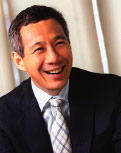Lee
Hsien Loong
Prime Minister of Singapore
Previously held positions:
Minister of Finance
Minister of trade and industry
Second Minister for Defence
Chairman of Monetary Authority of Singapore
Member economy: Singapore
Lee Hsien Loong was born in 1952 is the eldest child of former-Prime Minister
Lee Kuan Yew. He spent his schooling years in Singapore and then he studies
mathematics at Trinity College, Cambridge, where he graduated in 1974 with First
Class Honours in Mathematics and a Diploma (with distinction) in Computer Science.
He then obtained a Master of Public Administration from Harvard University's
Kennedy School of Government in 1980. Lee Joined the Singaporean Armed forces
in 1971 and became a member of parliament in 1984. He has risen though the ranks
and is currently the Minister of Finance and the Prime Minister of Singapore.
At APEC
2006 Prime Minister Lee Hsien Loong presented a key note address on “successfully
competing for Foreign Direct Investment and the lessons learned from East Asian
Economies”. Mr Lee stressed the importance of Foreign Direct Investments
(FDIs) in promoting growth and development. He said that they increase productive
capacity, bring in new technology, open up access to overseas markets, create
jobs and raise living standards for the people. He also said that globalisation
has further increased the significance of FDIs. Mr Lee added that the opening
up of markets is not always easy to sustain. Bringing in foreign competition
can put pressure on local companies, even when it benefits consumers, workers
and the wider economy. The impact of company closures and job losses are usually
concentrated and felt immediately; however the benefits of opening up (which
are greater and more widespread) are generally felt indirectly. Mr Lee suggested
that there are three main factors countries need to consider to make themselves
more attractive to foreign investment. They need to have sound micro and macro-economic
policies, build their capabilities for the future and also to embrace globalisation.
Mr Lee referred to the collapse of the Doha Round of WTO talks as an example
of the worrying protectionist trend growing in many countries. He said that
economic frictions and obstacles to trade and investment not only stunt economic
growth but also weaken countries’ stakes in one another. Mr Lee thinks
that globalisation has its downsides but thinks it is the best way forward to
create growth and wealth, and foster trade and interdependence. He said that
the key responsibility of APEC is to harness the full benefits of globalisation
while containing its risks.
I was personally
very impressed by Mr Lee’s speech. He came across as a very confident
person who is giving good direction to his country. Mr Lee was a big advocate
of free trade and foreign investment but was still wary that globalisation has
its costs. He also thought that foreign investment does not just happen and
that governments need to create the right environment to be attractive to foreign
investment. Mr Lee’s most important comment in my opinion was he said
that the free flow of trade brings common interest to countries and helps avoid
tension and conflict.
Quotes:
“We can not eat the disk drives that we make”
“The more we restrict the flow of trade and investments, the more likely
that we will have rivalry and tensions, rather than shared interests in one
another”
Compiled
by: Blair Paterson – New Zealand
